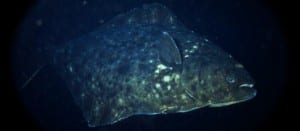Frozen inventory of halibut and black cod from last season along with a weakening Japanese Yen are cooling off hot markets for Alaskan fish. That’s according to Trident Seafoods Petersburg plant manager Dave Ohmer. He recapped the 2011 fishing season and offered some thoughts about the upcoming year at a noon meeting of the Petersburg Rotary Club this week.
For iFriendly audio, click here:
Ohmer said processors are seeing a lack of enthusiasm from buyers of longline halibut and black cod because of high prices and frozen inventory leftover from last season. “We came into this year with a carryover, a carryover of halibut in the freezer, two and a half to three million pounds of halibut in the freezer right now,” Ohmer said. “Which leads to the market not having to get real excited about fresh halibut, ready to fight prices down.”
Ohmer said frozen inventory going into the 2009 season dropped halibut prices into the three dollar a pound range. Last year, processors were paying around six and a half to seven dollars a pound at the docks, some of the highest prices in decades. Ohmer said high prices at the docks translated to high prices for consumers. “Those prices led to on the shelf in Seattle Costco was $17.99 for fillets. If you went into a Thriftway or other places you were gonna pay over 22, 23 or 24 dollars a pound. We’re doing pretty well here in Petersburg financially but I don’t buy protein at 24 dollars a pound,” Ohmer said. “And so it got where halibut was only going to some elite places, white tablecloth, people that had money to buy that and it led to not getting full consumption of last year’s pack. Which takes us into this year. Now I don’t think we’re gonna see the disaster we saw in 2009. We’re not talking about dropping down to three dollars, four dollars or even five dollars, but we’re not going to see this continued push of higher and higher prices.”
Longlining for halibut and black cod started up March 17th. The fleet has landed 12 percent of the quota for both species.
Ohmer said frozen inventory is also impacting the price for black cod this season, along with a weakening Japanese Yen. Last year high prices for halibut and black cod as well as historical prices for salmon made for a strong fishing season for Petersburg’s fleet and processing companies. Ohmer called 2011 a very good year. “Lots of volume, coupled with high prices led to very, very successful years and if our fishermen are making money it’s good for travel in and out of Petersburg, its good for our hotels, its good for everybody and certainly good for people in the business of supporting the fleet in any way they do so, very very good year,” he said.
This year’s forecast for pink salmon is under one third of last years total catch and Ohmer said he didn’t expect another year like 2011. “Coming off the wonderful year we just finished, looking at this year, there are some… lack of volume and maybe not the continued upgrowth of prices to live with. It’s like anything else, in the fishing business, if you have a great year, it doesn’t mean, you cant look at a fisherman and say, you can’t base his livelihood on the best year he had. There’s a lot of down years that we’ve faced. This year volume is going to make it a tougher year.”
Ohmer said it was too early to say what salmon prices would be for the 2012 season. Trident is one of three large seafood processing companies in Petersburg. It also operates plants in Wrangell, Ketchikan, Bristol Bay and the Aleutians.










